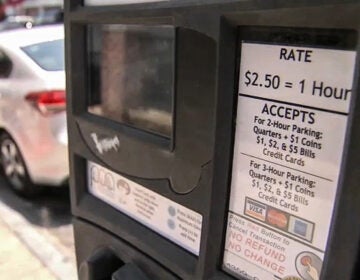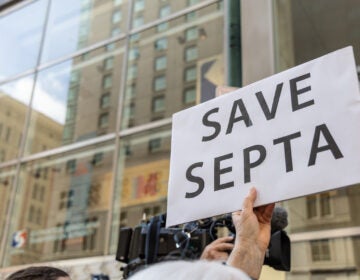Breaking news: SEPTA softens stance on fares – a bit

May 20, 2010
By Anthony Campisi
For PlanPhilly
SEPTA has shaved some of its proposed fare hikes for regional rail riders.
Frank Gormley, SEPTA’s operating budget director, told a hearing of the SEPTA Board’s budget, planning and information technology committee the change was being made in response to concerns raised by the public and transit advocates that the authority wanted to hike regional rail fares more than transit division fares.
The revised budget proposal would affect weekly and monthly TrailPass holders, as well as riders who purchase ten trip discounted tickets.
SEPTA treasurer and CFO Richard Burnfield said the average regional rail rider would see a fare increase of slightly more than 8 percent under the new proposal. The original proposal would have raised the average regional rider’s fare between 9 and 10 percent.
You can download a spreadsheet of the revised proposal below.
Disabled passenger won’t ride free under this proposal. Instead, SEPTA is extending the disabled fares to the peak hours. Disabled riders now have to pay full fare during the morning and evening rush. The new proposed disabled fare is $1 — so disabled riders will just be able to pay that rather than have to worry about buying a TransPass or paying $2 during the rush hours. Disabled riders advocated strongly that they should get the same treatment as senior citizens, who can ride for free all day.
During the public hearing process, the authority submitted a document to retired Judge James Colins — the independent hearing examiner who evaluated SEPTA’s operating budget proposal — saying that allowing disabled riders to ride for free during rush hours could slow boarding and cause operational difficulties for bus drivers.
In an interview after the hearing, Burnfield said that document should be disregarded and that the proposed change “is the right thing to do.” He added that the growing prevalence of low-floor buses addresses boarding concerns, since riders in wheelchairs can board without the use of a lift.
All told, Burnfield said the fare and policy changes will cost $700,000. He hopes that growing ridership will offset that loss. It was up 5.5 percent in April, a huge jump after months of stagnant or falling ridership.
Reacting to the new proposal, Matt Mitchell of the Delaware Valley Association of Rail Passengers, a transit advocacy group that opposed the first proposal, said that, though this iteration represented “progress,” the authority hadn’t gone far enough. He said the proposed regional rail fare hike remained too high. DVARP also remains opposed to certain policy changes SEPTA wants to make, such as eliminating midday, off-peak fares. Those changes remain in the new proposal.
Mitchell wants SEPTA to adopt a 6 percent across-the-board fare hike, which he says will cover the cost of inflation and allow SEPTA to balance its operating budget for the next two to three years.
SEPTA’s revised proposal also came under questioning from SEPTA Board members. Questions focused on the $2 cash fare for buses, trolleys and the subways.
Thomas E. Babcock expressed concern that SEPTA’s plans to avoid raising the cash fare while hiking the price of TransPasses could discourage riders from purchasing passes, which cost less for the authority to process and handle. Burnfield said that raising the cash fare would slow boarding because it would force riders to fumble with change at the farebox.
Board members also asked about SEPTA’s long-term goal of reducing the number of fare zones and types of fares. Burnfield said that reduction was happening gradually and would be greatly assisted by the introduction of a new smart card fare collection system.
In another small change to the operating budget, Gormley, the operating budget director, said rising health care costs have forced SEPTA to increase the size of its budget by about $4 million. The budget proposal stands at about $1.2 billion.
The capital budget proposal was also reviewed by the committee, but no changes have been made.
The full SEPTA Board will consider the budget proposals at an upcoming meeting.
In other news, SEPTA’s operations committee reviewed a new five-year labor contract with Transport Workers Union Local 2013, which represents 128 regional rail division employees working as car inspectors and custodians. The agreement is patterned off SEPTA’s contract with TWU Local 234, which represents city transit workers. However, the $1,200 signing bonus workers will receive will come from SEPTA’s own coffers — Gov. Rendell’s offer to cover the Local 234 signing bonus with state money didn’t apply to this union contract.
This is the fifth of 17 union contracts that have been settled, with all of them following the pattern set by Local 234. SEPTA will have to pay the signing bonuses for all workers covered under the remaining unions.
The committee also reviewed a series of land deals in Lower Gwynedd Township that will be used to expand parking by up to 100 spaces at the Gwynedd Valley regional rail station. The committee reviewed another land purchase in Upper Darby for work connected to rehabilitation work at the Secane regional rail station and a land purchase in Langhorne Manor Borough in connection with improvements at the Langhorne regional rail station.
The committee also looked at a 10-year lease of a parcel near the 46th Street Market-Frankford El station to the Enterprise Community Development Corp., which will use the space for community gardens and open space for the neighborhood.
SEPTA’s administration committee reviewed a series of contracts, including a new $38.7 million contract to CompServices Inc. for the administration of the authority’s workers’ compensation managed care program. The contract also includes up to 1,000 pre-employment physical examinations. CompServices has held the contract for 11 years, and SEPTA officials credit it with holding down workers’ compensation costs.
Contact the reporter at campisi.anthony@gmail.com
WHYY is your source for fact-based, in-depth journalism and information. As a nonprofit organization, we rely on financial support from readers like you. Please give today.






